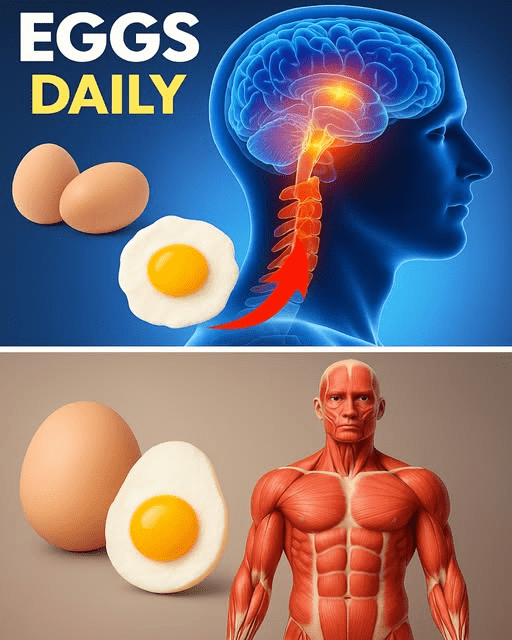You crack one open almost every morning. The golden yolk sizzles, the aroma fills the kitchen, and you tell yourself, “It’s healthy—it’s just an egg.” But what if that simple breakfast staple isn’t as innocent as it looks? What if behind that shell lies a mix of benefits, hidden risks, and surprising truths most people never hear about?

Eggs are one of the most commonly eaten foods on the planet—an American household consumes an average of 280 eggs per person each year. We scramble them, fry them, boil them, and bake them into desserts. But few of us really understand what’s happening inside that oval shell.
Some facts will reassure you. Others might make you pause before cracking the next one. Let’s uncover the truth—because once you learn these 11 eye-opening facts, you’ll never look at your breakfast plate the same way again.
The Hidden Side of a “Perfect Food”
Eggs have long been called “nature’s multivitamin.” They’re packed with protein, vitamins, and minerals. But the story isn’t black and white—or should we say, yolk and white? Beneath their smooth shell, there’s more complexity than most people imagine.
From cholesterol myths to storage safety, from heart health to hidden contaminants, the truth about eggs may surprise you. Ready to find out? Let’s begin our countdown of the 11 facts you need to know before your next bite.
11. The Cholesterol Debate Isn’t Over
You’ve probably heard it before: eggs are high in cholesterol. A single large egg contains about 186 milligrams—all in the yolk. While newer research suggests dietary cholesterol may not impact blood cholesterol as much as once believed, it’s not completely off the hook.
For people with diabetes or heart concerns, regular egg consumption could still influence LDL (“bad”) cholesterol levels. The key? Moderation. Two to four eggs a week may be fine, but daily indulgence could tip the scales.
And yet, cholesterol isn’t the real shocker…

10. The Way You Cook Eggs Changes Their Health Impact
A runny yolk or crispy edge might be your preference, but how you cook eggs can make or break their nutritional value. High heat—like frying—can oxidize cholesterol, creating compounds linked to inflammation.
Meanwhile, boiling or poaching keeps nutrients intact. So, if you want to keep your arteries happy, you might want to rethink that sizzling bacon-and-egg combo.
9. Some Eggs Contain Hidden Antibiotic Residues
This one surprises many people. In large-scale poultry farming, antibiotics are often used to prevent disease in hens. While regulations limit their presence in eggs, trace residues can still occur.
That’s why organic or pasture-raised eggs, from hens not treated with antibiotics, may be a safer and cleaner choice. You can actually taste the difference—the yolk is darker, richer, and more flavorful.
And speaking of flavor, did you know it can say a lot about what’s inside?
8. The Yolk Color Reveals the Hen’s Diet
Ever wonder why some yolks are pale yellow while others are deep orange? It’s not just breed—it’s diet. Chickens that eat corn and marigold petals produce more vibrant yolks rich in carotenoids, the same antioxidants found in carrots.
So that bright golden yolk isn’t just pretty—it may also pack more nutritional punch.
7. Raw Eggs Aren’t as Healthy as You Think
Some fitness enthusiasts swear by raw eggs for protein. But here’s the truth: your body only absorbs about half the protein from raw eggs. Plus, raw eggs carry the risk of salmonella contamination, which can cause serious illness.
Cooking doesn’t just make them safer—it unlocks their full nutritional potential. And that’s something most people don’t realize.
Comparison Table: Raw vs. Cooked Eggs
| Aspect | Raw Eggs | Cooked Eggs |
|---|---|---|
| Protein Absorption | ~50% | ~90% |
| Safety | Risk of salmonella | Safe when cooked properly |
| Digestibility | Lower | Higher |
| Nutrient Availability | Partial | Full |
| Recommended Use | Not advised | Best choice for health |
But bacteria aren’t the only invisible thing you need to worry about…
6. Eggs Can Spoil Even Before the “Best By” Date
Just because your carton looks fine doesn’t mean the eggs are. Temperature changes during transport can cause bacteria like E. coli to grow before the expiration date.
Here’s a quick test: place your egg in a glass of water. If it sinks, it’s fresh. If it floats, it’s old and should be tossed. Simple science can keep your stomach safe.
And while freshness is key, there’s another detail most people ignore completely—egg washing.
5. Washed Eggs Lose Their Natural Protection
In the U.S., eggs are washed before sale, but that removes a thin protective coating called the “bloom.” Once it’s gone, the shell becomes more porous, allowing bacteria to sneak in.
That’s why refrigerated storage is crucial for American eggs, while many countries safely keep unwashed eggs at room temperature.
It’s a small difference—but it completely changes how long your eggs stay safe to eat.

4. Brown vs. White Eggs – The Truth
You’ve probably paid extra for brown eggs thinking they’re healthier. Here’s the truth: they’re not. The color difference comes from the hen’s breed, not the nutrition inside.
Brown eggs often cost more simply because the hens that lay them eat more. So, unless they’re organic or pasture-raised, that price bump isn’t buying you extra nutrients.
But that’s not the only marketing myth you’ve been told.
3. “Free-Range” Doesn’t Always Mean Free
The term “free-range” sounds idyllic—hens roaming open fields under blue skies. In reality, regulations only require hens to have access to outdoor areas, which can be minimal.
If you truly want ethically raised, nutrient-rich eggs, look for “pasture-raised.” These hens actually graze outdoors, eat natural insects and plants, and produce eggs with higher omega-3s.
And you can taste the difference: richer, creamier, fresher.
2. Eggs Can Trigger Allergies at Any Age
Most people associate egg allergies with children—but adults can develop sensitivities, too. Symptoms can range from mild rashes to digestive upset or respiratory issues.
If eggs suddenly make you feel bloated or uneasy, your body might be signaling a developing intolerance. Listen to it—it’s often smarter than you think.
And now, for the final fact—the one that truly changes everything you thought you knew about eggs.
1. Eggs Might Not Be for Everyone’s Heart
For decades, eggs were villainized for heart disease. Then they were redeemed. But the truth lies in between. Some people—especially those with specific gene types or existing heart issues—process cholesterol differently.
For them, frequent egg consumption may raise cardiovascular risks. That’s why “one size fits all” nutrition advice rarely works. Your body’s reaction matters more than any study headline.
Comparison: Eggs’ Nutritional Strengths vs. Potential Risks
| Benefit | Potential Concern |
|---|---|
| High-quality protein | High cholesterol content |
| Vitamins A, D, E, B12 | Risk of contamination if undercooked |
| Antioxidants for eye health | Possible allergy or intolerance |
| Affordable and versatile | Nutrient loss if fried or overcooked |
Case Study #1: Emily’s Energy Dilemma
Emily, 52, started eating two eggs every morning for energy. After six months, her cholesterol levels went up unexpectedly. Her doctor suggested cutting back to three per week and adding more vegetables.
Within weeks, her energy returned—and so did her balance. “It wasn’t about cutting out eggs,” she said. “It was about finding my right amount.”
Case Study #2: Robert’s Recovery
Robert, 60, had stopped eating eggs entirely after a heart scare. But later, his nutritionist reintroduced them—poached, not fried—and paired them with fiber-rich oats.
“Now I enjoy eggs again,” he said, “without guilt or fear.” His story proves that how you eat them matters as much as how many you eat.

How to Enjoy Eggs Safely and Smartly
If you love eggs (and who doesn’t?), you don’t have to give them up. You just need to make smarter choices.
Healthy Egg Habits
| Tip | Why It Matters |
|---|---|
| Choose organic or pasture-raised eggs | Higher nutrient density, lower residue risk |
| Cook at medium heat | Preserves nutrients and reduces oxidation |
| Store in fridge (not door) | Keeps temperature consistent |
| Limit to 3–5 eggs per week | Supports heart health balance |
| Combine with vegetables | Boosts antioxidants and fiber |
The Final Takeaway
Eggs are powerful little packages of nutrition—but like many things in life, they come with conditions. They can support your health, or quietly challenge it, depending on how and how often you eat them.
So, the next time you crack an egg, pause for a second. Notice its color, texture, freshness. Make a conscious choice—not just for taste, but for long-term health.
Because sometimes, the difference between harm and health is as thin as an eggshell.
This article is for informational purposes only and should not replace professional medical advice. Always consult your healthcare provider for personalized guidance

Nhận xét
Đăng nhận xét